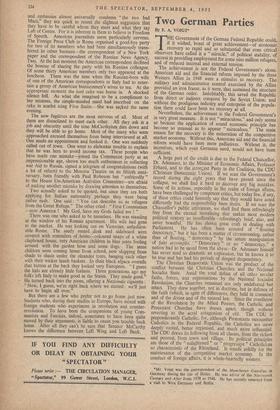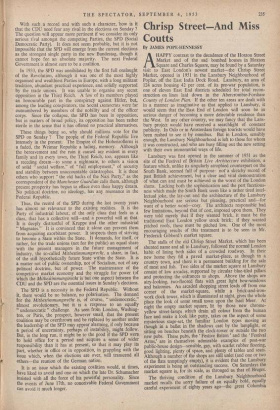Two German Parties
By F. A. VOIGT*
THE Government of the German Federal Republic could, if it wished, boast of great achievement—of economic recovery so rapid and so substantial that even critical observers have called it a " miracle," of political stability, of success in providing employment for some nine million refugees, and of reduced internal and external tension.
The achievement is not the Federal Government's alone. American aid and the financial reform imposed by the three Western Allies in 1948 were a stimulus to recovery. The military and administrative control exercised by the Allies provided an iron frame, as it were, that sustained the structure of the German order. Indubitably, this saved the Republic from direct or indirect conquest by the Soviet Union; and without the prodigious industry and enterprise of the popula- tion there could have been no recovery at all. Nevertheless, the achievement is the Federal Government's in very great measure. It is not " miraculous," and only seems so because the application of sound economic principle has become so unusual as to appear " miraculous.' The main reason for the recovery is the restoration of the competitive market economy. Without this, American aid and the financial reform would have been mere palliatives. Without it, the incentives, which even Germans need, would not have been sufficient.
A large part of the credit is due to the Federal Chancellor, Dr. Adenauer, to the Minister of Economic Affairs, Professor Erhard, and to the strongest Party in the Coalition, the CDU (Christian Democratic Union). If we scan the Government's record during the eight years that have passed since the collapse, we shall find it hard to discover any big mistakes. Some of its actions, especially in the realm of foreign affairs, have been challenged by competent critics, but today few, if any, of these critics could honestly say that they would have acted differently had the responsibility been theirs. If we scan the Chancellor's public utterances, we shall find them refreshingly free from the eternal moralising that makes most modern political oratory so insufferable—refreshingly brief, also, and never boastful. He has shown great craft in dealing with Parliament. He has often been accused of " flouting democracy," but it has been a matter of circumventing, rather than of flouting, " democracy " by the astute manipulation of faits accomplis. ' Democracy ' or no " democraey," a nation had to be saved from the abyss—Dr. Adenauer himself has never used so dramatic an expression, but he knows it to be true and has had his periods of deepest despondency. A large part of the credit is due to the Federal Chancellor, Dr. Adenauer, to the Minister of Economic Affairs, Professor Erhard, and to the strongest Party in the Coalition, the CDU (Christian Democratic Union). If we scan the Government's record during the eight years that have passed since the collapse, we shall find it hard to discover any big mistakes. Some of its actions, especially in the realm of foreign affairs, have been challenged by competent critics, but today few, if any, of these critics could honestly say that they would have acted differently had the responsibility been theirs. If we scan the Chancellor's public utterances, we shall find them refreshingly free from the eternal moralising that makes most modern political oratory so insufferable—refreshingly brief, also, and never boastful. He has shown great craft in dealing with Parliament. He has often been accused of " flouting democracy," but it has been a matter of circumventing, rather than of flouting, " democracy " by the astute manipulation of faits accomplis. ' Democracy ' or no " democraey," a nation had to be saved from the abyss—Dr. Adenauer himself has never used so dramatic an expression, but he knows it to be true and has had his periods of deepest despondency. The Christian Democratic Union was the product of the conflict between the Christian Churches and the National Socialist State. Amid the, total defeat of all other secular faiths, forces, and organisations by the National Socialist Revolution, the Churches remained not only undefeated 'but intact. They drew together, not in doctrine, but in defence of the faith (which, in spite of differences, they held in common) and of the divine and of the natural law. Since the overthrow of the Revolution by the Allied Powers, the Catholic and Protestant Churches have drawn apart, though without reverting to the acrid antagonism of old. The CDU is preponderantly Catholic, for, although Protestants outnumber Catholics in the Federal Republic, the Catholics are more deeply rooted, better organised, and much more influential. The CDU draws its following from all classes, from the richest and poorest, from town and village. Its political principles are those of the " enlightened " or " progressiye " Catholicism so characteristic of the Rhineland. It stands solidly for the maintenance of the competitive market economy. In the conduct of foreign affairs, it is whole-heartedly western.
*Mr. Voigt was the correspondent of the Manchester Guardian in Germany during the rise of Hitler. He was editor of the Nineteenth Century and After from 1938 to 1946. He has recently returned from With such a record and with such a character, how is it that the CDU need fear any rival in the elections on Sunday ? The question will appear more pertinent if we consider its only serious rival amongst the competing Parties, the SPD (Social Democratic Party). It does not seem probable, but it is not impossible that the SPD will emerge from the current elections as the strongest single party in the new Bundestag, though it cannot hope for, an absolute majority: The next Federal Government is almost sure to be a coalition.
In 1933, the SPD was annihilated by the first full onslaught of the Revolution, although it was one of the most highly organised and wealthiest Parties in Europe, with a long militant tradition, abundant practical experience, and solidly supported by the trade unions. It was unable to organise any secret opposition in the Third Reich. A few of its members played an honourable part in the conspiracy against Hitler, but, among the leading conspirators, the Social Democrats were far outnumbered by members of the nobility and of the officer corps. Since the collapse, the SPD has been in opposition, but in matters of broad policy, its opposition has been rather sterile in the sense that it has offered no practical alternatives.
These things being so, why should millions vote for the SPD on Sunday ? The people of the Federal Republic live intensely in the present. The Empire of the Hohenzollerns is a faded, the Weimar Republic a fading, memory. Although the bereavement and the ruin it caused are evident in every family 'and in every town, the Third Reich,. too, appears like a receding dream—to some a nightmare, to others a vision Of solid " social welfare," of " full employment," of security and stability between unaccountable catastrophes. It is these others who support " the old hacks of the Nazi Party," as the correspondent of the Manchester Guardian calls them, although present prosperity has begun to efface even their happy dream. No political doctrine, no ideology, has any resonance in the Federal Republic.
Thus, the record of the SPD during the last twenty years has almost no relevance to the existing realities. It is the Party of industrial labour, of the only class that feels as a class, that has a collective will—and a powerful will at that. It is deeply distrustful of Krupps and the other industrial "Magnates." It is convinced that it alone can prevent them from acquiring exorbitant power. It suspects them of striving to become a State within the State. It demands, for itself, or rather, for the trade unions (not for the public) an equal share with the present managers in the future management of industry, the so-called Mitbestimmungsrecht, a share, in fact, of the still hypothetically future State within the State. It is a matter not of public ownership, not of Socialism, not of any political doctrine, but of power. The maintenance of the competitive market economy and the struggle for power (of Which the Mitbes. linunungarecht is but one aspect) between the CDU and the SPD are the essential issues in Sunday's elections.
The SPD is a necessity in the Federal Republic. Without it, there would be no balance, no polarisation. The demand for the Mitbestimmungsreeht is, of course, " widemocratic," almost revolutionary, but it is a response to an equally " undemocratic " challenge. As seen from London, Washing- ton, or Paris, the prospect, however small, that the present coalition may be overthrown and be replaced by another under the leadership of the SPD may appear alarming, if only because a period of uncertainty, perhaps of instability, might follow. But, in the long run, it might be to the good if the SPD were to hold office for a period and acquire a sense of wider responsibility than it has at present, so that it may play its part, whether in office or in opposition, in grappling with the issue which, when the elections are over, will transcend all others—the reunion of the German nation.
It is an issue which the existing coalition would, at times, have liked to avoid and one on which the late Dr. Schumacher insisted with all the force of his powerful personality. Since the events of June 17th, no conceivable Federal Government can avoid it much longer.



































 Previous page
Previous page